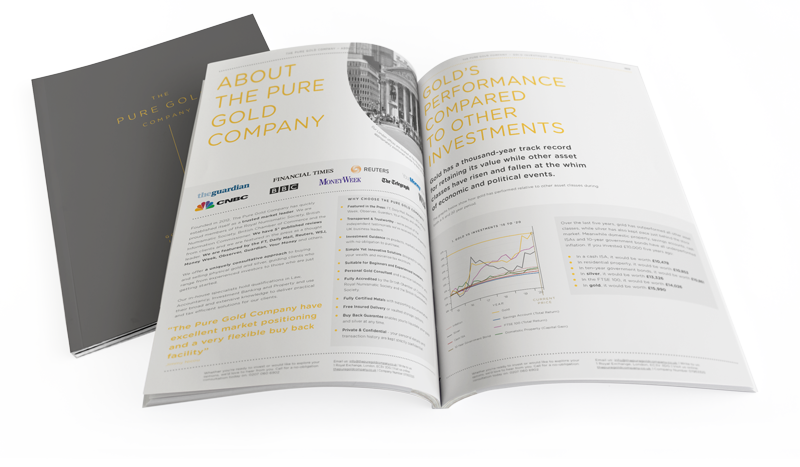Inflation has caused havoc to prices and affordability for the last two years. Any assets that aren’t rising in value faster than inflation are losing value in real terms. So, is it possible to inflation-proof your investments? In the current situation (inflation at or near double figures) the answer is not entirely. But there are certain steps you can take to protect your investments, from reconsidering cash in the bank to diversifying your portfolio. You could also consider investing in assets, like gold, that have a history of withstanding inflationary pressure over the long term, whilst providing future growth opportunities..
How bad is it really?
UK inflation rose sharply and quickly over the last two years, causing a major cost-of-living crisis and forcing the Bank of England to raise rates repeatedly, compounding unaffordability.
The speed and severity of inflationary pressures, amplified by the pandemic, caught many people off guard. In 2021 bankers and analysts were calling inflation ‘transitory’ but instead it rocketed up and, in the UK at least, has stayed very high for over a year now.
This extreme inflationary environment is unusual but not unprecedented. Inflation topped out at around 25% in 1975 having risen steadily from the late sixties and only settling below 10% in the early 1980s. But this means most working-age people have never experienced the debilitating effects of rampant rising prices. For most, we’ve become used to inflation levels within striking distance of the UK government’s target of 2% for almost 40 years.
Is inflation really necessary?
Most governments believe some amount of inflation is good for the economy. The theory is that moderate inflation drives consumption which is necessary to drive growth. If people think prices will be lower tomorrow or next week, they will delay purchases and this will slow growth. When people delay purchases and manufacturers are forced to cut prices continuously, deflation can set in and it can be just as difficult to remedy as inflation.
So, we’ve become used to a gradual rise in the cost of coffee and bread and T-shirts, unprepared for the sustained onslaught of rising prices for the last 18 months.
Whose fault is it anyway?
The current high inflation has many causes, chief among these was the pandemic shut downs which limited the supply and movement of goods and services, which pushed up prices. This was compounded by labour shortages caused by people exiting the workforce during the pandemic due to early retirement, illness or migration (Brexit), which has caused wage inflation. And the UK’s reliance on natural gas for energy needs when gas prices have surged in the wake of the Ukraine war has been a key factor behind the cost-of-living crisis.
What can you do?
The first thing to consider when looking to inflation-proof your assets is cash in the bank. Aside from a few months in 2015, inflation has been higher than interest rates since late 2008. This means that unless you locked up your savings in a long-term higher interest account, any cash has been losing value for many years.
Now that interest rates are on the rise, savings accounts are paying more than the near 0% they paid when rates were so low for so long. Easy access accounts can pay up to around 5% and fixed or regular saving accounts (with restrictions) can be found for up to 7%. This still won’t beat out current inflation levels. The Consumer Price Index was 8.7% and the Retail Price Index (which includes mortgage interest payments) was 11.3% in May.
The benefit of easy access cash is the agility to respond to new opportunities quickly, but this must be weighed with the cost of a decline in the value of that cash as inflation remains high.
Discover Gold’s Unique Tax Advantage
Most investments are subject to some form of taxation, but physical gold can be totally free of VAT and capital gains tax.

Diversity
A diversified portfolio shouldn’t only be considered during times of high inflation, but it certainly comes into its own when markets are uncertain. Diversification means investing in different types of assets, preferably ones that can counterbalance declines to smooth out any market volatility. Diversity can be within and outside an asset class.
During more moderate inflationary periods, especially in times of growth, stock market investments can keep pace with rising prices. But when markets fall or inflation rises, or both at the same time, value erosion can occur.
Including both high-risk and low-risk stocks in your share portfolio can provide balance if the market comes under pressure. Other investment options like inflation-linked bonds, mutual funds and real estate (funds or physical property), will also help to counteract unexpected or unpredictable market events.
Actively waiting
If keeping cash in the bank is guaranteed to lose value, and markets are in the midst of uncertainty, you could instead invest in an asset that is not guaranteed to lose value, may gain it, has no counterparty risk and is almost as liquid as cash.
Commodities, particularly gold, are often identified as an inflation hedge because they are subject to the same inflationary pressures as other goods so tend to rise when inflation rises. The relationship is not absolute, as there are many factors that influence the gold price, including interest rates, which have been rising quickly over the last 18 months. Even so, gold has held onto its safe-haven status because it has maintained value over thousands of years, and as a long-term investment can provide stability within a diverse portfolio. In the UK, physical gold also benefits from special tax breaks that make it possible to invest entirely tax-free.
The specific advantages of physical gold enhance its safe-haven status. For one, there is no counter-party risk, of the company or bank going bust. In an actual financial crisis, bank deposits are only protected up to £85,000 in the UK, and a sudden market crash or major banking crisis could cause overstretched institutions to fail.
In addition, certain types of physical gold coins are legal tender for UK residents. This means they don’t attract any capital gains tax when you come to sell them after weathering the economic storm. For example, Gold Sovereigns and Gold Britannias can be held for any length of time and then sold without incurring any capital gains tax depending on individual circumstances, unlike exchange-traded funds or stocks.
The current elevated level of inflation is impacting everyone. The cost-of-living crisis, mortgage shock from interest rate rises and relentlessly increasing energy bills are conspiring to erode savings and investments. When you have something to protect, it’s worth diversifying with safe-haven assets like gold to secure your assets against value erosion.


